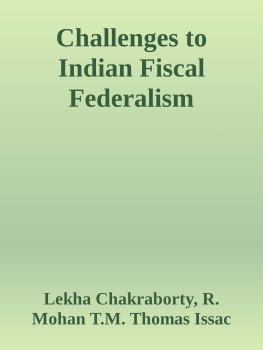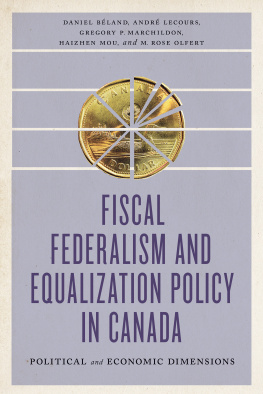OECD - Fiscal Federalism 2016
Here you can read online OECD - Fiscal Federalism 2016 full text of the book (entire story) in english for free. Download pdf and epub, get meaning, cover and reviews about this ebook. year: 2016, publisher: / /OECD Publishing, genre: Politics. Description of the work, (preface) as well as reviews are available. Best literature library LitArk.com created for fans of good reading and offers a wide selection of genres:
Romance novel
Science fiction
Adventure
Detective
Science
History
Home and family
Prose
Art
Politics
Computer
Non-fiction
Religion
Business
Children
Humor
Choose a favorite category and find really read worthwhile books. Enjoy immersion in the world of imagination, feel the emotions of the characters or learn something new for yourself, make an fascinating discovery.

Fiscal Federalism 2016: summary, description and annotation
We offer to read an annotation, description, summary or preface (depends on what the author of the book "Fiscal Federalism 2016" wrote himself). If you haven't found the necessary information about the book — write in the comments, we will try to find it.
OECD: author's other books
Who wrote Fiscal Federalism 2016? Find out the surname, the name of the author of the book and a list of all author's works by series.
Fiscal Federalism 2016 — read online for free the complete book (whole text) full work
Below is the text of the book, divided by pages. System saving the place of the last page read, allows you to conveniently read the book "Fiscal Federalism 2016" online for free, without having to search again every time where you left off. Put a bookmark, and you can go to the page where you finished reading at any time.
Font size:
Interval:
Bookmark:

Flicitations et merci davoir tlcharg lun de nos tout nouveaux ePub en version bta.
Nous exprimentons ce nouveau format pour nos publications. En effet, mme si lePub est formidable pour des livres composs de texte linaire, le lecteur peut tre confront quelques dysfonctionnements avec les publications comportant des tableaux et des graphiques tout dpend du type de support de lecture que vous utilisez.
Afin de profiter dune exprience de lecture optimale, nous vous recommandons :
- Dutiliser la dernire version du systme dexploitation de votre support de lecture.
- De lire en orientation portrait.
- De rduire la taille de caractres si les tableaux en grand format sont difficiles lire.
Comme ce format est encore en version bta, nous aimerions recevoir vos impressions et remarques sur votre exprience de lecture, bonne ou autre, pour que nous puissions lamliorer lavenir. Dans votre message, merci de bien vouloir nous indiquer prcisment quel appareil et quel systme dexploitation vous avez utilis ainsi que le titre de la publication concerne. Vous pouvez adresser vos remarques ladresse suivante :
Merci !
Congratulations and thank-you for downloading one of our brand-new ePub-in-beta editions.
We're experimenting with this new format and, while ePub is fantastic for books with linear text, for books with charts, tables and graphs weve found some things may not work perfectly it depends on the device youre using.
So, for an optimal reading experience, we recommend:
- Using the latest version of your devices operating system.
- Reading in portrait mode.
- If large tables are tricky to read, try reducing the text size.
As this is an ePub-in-beta edition, we would be glad to receive feedback on your reading experience, good or otherwise, so we can improve for the future. When writing, please let us know which device/operating system you were using and the title of the publication. Write to:
Thank you!
OECD/KIPF (2016), Fiscal Federalism 2016: Making Decentralisation Work, OECD Publishing, Paris, http://dx.doi.org/10.1787/9789264254053-en.
Almost 35% of public money is spent at the sub-national government level. State and local governments shape education, healthcare, infrastructure and other key policy areas, affecting productivity and the sustainability of public finances. The funding of public services through taxes and transfers is not only a key determinant of a countrys growth, but most importantly it is a critical driver for the advancement of the well-being of its citizens.
The economic and financial crisis that hit much of the world in 2008 exposed major weaknesses in fiscal frameworks and the co-ordination between different administrations within countries. Without reforms to fiscal relations, many governments will continue to struggle. The relations between national and sub-national governments, often the bedrock of a countrys institutions, require a review so that growth for all and in all jurisdictions is to take off again.
This book draws on the work of the OECD Fiscal Network and the discussions of its delegates, presenting a compilation of some of the most salient policy issues in fiscal federalism. It concludes that, although spending and revenue decentralisation has seen progress over the last two decades, it has become skewed and the vertical fiscal imbalance has increased. One of the books chief findings is the importance of taking decentralisation forward coherently if public finances are to become more efficient, equitable and sustainable. The book also emphasises that property taxation can contribute to a strategic shift away from the taxation of labour towards less distorting taxes. It offers guidance on how reforms to tax and transfer systems can make governments more accountable to their citizens. And, in the current context of tight public finances, it highlights an emerging concern how sub-national governments should monitor and manage debt.

Angel Gurra
Secretary-General
This 2016 edition of Fiscal Federalism seeks to analyse and propose reform options in the area of intergovernmental fiscal frameworks and sub-central public finance. The policy issues that it addresses are of a structural and macroeconomic nature, covering both the spending and the revenue sides of the budget. After an introductory chapter summarising trends and developments in decentralisation since 1995, the book goes on to examine:
fiscal constitutions and how they shape intergovernmental fiscal relations and outcomes;
the recurrent tax on immovable property and how it may underpin moves towards a more efficient, inclusive tax system;
how a shift from intergovernmental transfers to own taxation may help increase the accountability and efficiency of governments;
how sub-national governments should monitor and manage debt;
the spending power of sub-national governments.
, A birds eye view of fiscal decentralisation , is the introductory chapter to the 2016 edition of Fiscal Federalism . It finds that, although the OECD area is more decentralised than two decades ago, decentralisation has also become more unbalanced. While subnational jurisdictions account for 32% of government spending on average, only 15% of tax revenues accrue to them, which increases the importance of intergovernmental transfers. However, sub-central tax autonomy the power to determine tax bases and rates has also grown. Recurrent taxes on immovable property are on the rise and, more than 20 years on, have overtaken income taxes again as the biggest sub-national tax source. Sub-national governments are responsible for almost two-thirds of public investment a share that has risen slightly over the last two decades, even defying the tight budget constraints after the 2008 crisis. While sub-national debt rose rapidly at that time, it is now generally evening out, although persistent rises in some countries levels of debt could be a cause for concern.
Font size:
Interval:
Bookmark:
Similar books «Fiscal Federalism 2016»
Look at similar books to Fiscal Federalism 2016. We have selected literature similar in name and meaning in the hope of providing readers with more options to find new, interesting, not yet read works.
Discussion, reviews of the book Fiscal Federalism 2016 and just readers' own opinions. Leave your comments, write what you think about the work, its meaning or the main characters. Specify what exactly you liked and what you didn't like, and why you think so.









